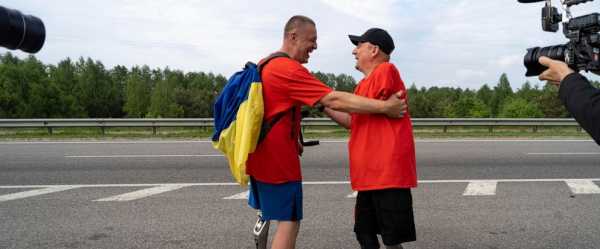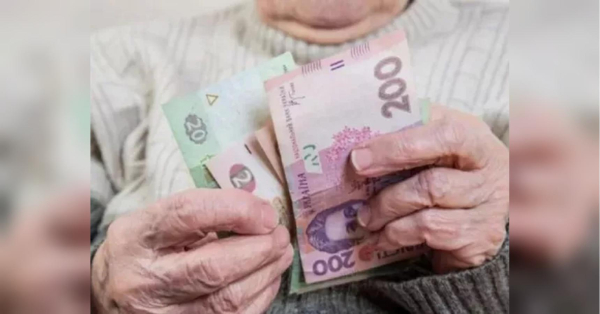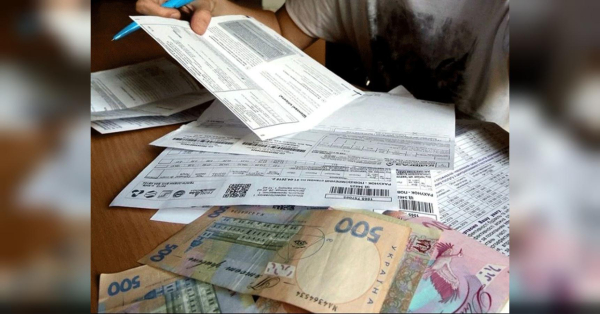
KYIV, Ukraine — The task for the Ukrainian war veterans was clear: From different cities, Oleksandr Shevtsov and Serhii Khrapko would walk 120 kilometers (75 miles) and meet somewhere in the middle in honor of their comrades wounded in Russia’s war against their homeland.
Their walk was shared on social media and they started collecting donations to raise funds to supply medical equipment to Ukraine’s main military hospital. Their walk was also an inspiration for many across the country — both the men were severely wounded in Russia's last major war with Ukraine in 2014 and had to have limbs amputated.
Unable to participate in the current war, the men found another way to contribute to the fight.
“I got a call from my brother in arms, Serhii Khrapko. We’ve known each other for a long time. He said: ‘Sania, our hospital needs aid,’” said Shevtsov. Sania is his nickname. “This is truly our dear hospital, the one that saved our lives. It saved my right leg,” he said.
“This is how we can help our brothers and sisters in arms, and in some way our country. Because our country is really fighting right now. We are all fighting in the ways we can.”
Khrapko, missing an arm and running with one prosthetic leg, left Kyiv on May 15 at 3:05 p.m. Shevtsov, who has a prosthetic leg, had begun the race from Zhytomyr three hours earlier. Five days later they met on the road, having walked a total of 165,156 steps toward each other over five days.
They raised 3.1 million hryvnias ($84,000), just short of the 500,000 hryvnias ($14,000) needed to purchase a new gastroscope for Ukraine’s National Military Medical Clinical Center.
Shevtsov, 38, was called up for military service nine years ago when pro-Russian separatists seized government buildings in Ukraine’s eastern Donbas region and proclaimed the Donetsk People’s Republic and Luhansk People’s Republic, as independent states, starting the war for the region.
On July 4 that same year, he was struck by shrapnel from an incoming attack in the outskirts of Luhansk, which caused severe damage to a major artery.
Doctors in the hospital worked frantically to revive blood flow to his limbs. Despite their best efforts, surgery did not work and his left leg was amputated.
He was released, with one leg salvaged after six months of surgical interventions.
But that is when Shevtsov’s private battle started.
He could not stand to wear the prosthetic leg provided to him. It stood in his bathroom, by his bed, for a long time, he said. What would other people think? He thought. He believed his friends would pity him, and he couldn’t bear the feeling. He was ashamed to even go outside and sit in his wheelchair in the yard, he said, in case anyone would see what became of him.
Then, he was sent to Austria to attend rehabilitation training. The experience changed him. He saw how people from all walks of life, from children to the elderly, walked with their prosthetic limbs with confidence.
He told himself, “I will never sit in a wheelchair again."
Before the war kicked off in 2014, Khrapko, 45, was a carpenter, making furniture for kindergartens. At the start of the war he was mobilized and served in the 30th Mechanized Brigade of the army.
In July 2015, a year after Shevtsov was injured, Khrapko was hit during a mortar attack, also in the outskirts of Luhansk.
His injuries were much more severe. The entire left side of Khrapko’s body was wounded. He had lost both an arm and a leg when he was admitted to the military hospital. He underwent over 20 operations.
The walk was Khrapko’s idea; it occurred to him when an employee at the hospital told them they desperately needed a gastroscope. So he called Shevtsov and told him they needed to raise, “a few million” hryvnias.
“How many exactly is a few?” asked his friend on the other end, according to Shevtsov’s account.
“More than 3,” his friend answered. “You will walk from Zhytomyr by foot, and I will walk to Kyiv to meet you. That’s how we will raise this money.”
Khrapko conceded he may have acquired some calluses after the long jaunt. “But that’s not a high price,” he said. “It’s a drop in the ocean compared with what is happening in the east.”
Sourse: abcnews.go.com






